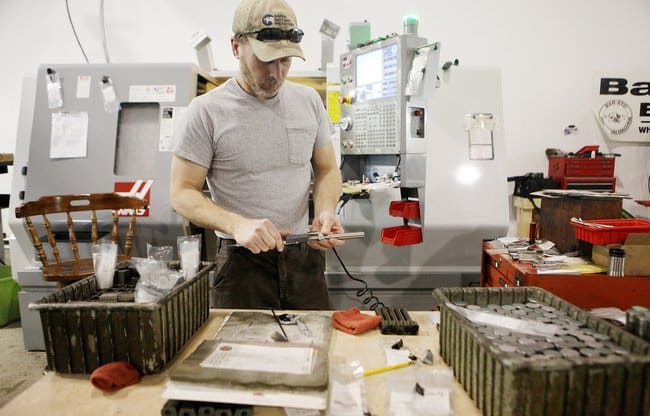The New York Times notices that there are an awful lot of firearms manufacturers based in decidedly gun-hostile states. Places like Massachusetts, Connecticut and Illinois. It’s a situation that’s bemused and befuddled gun rights supporters for years, many of whom have asked why they stay in environments that are so unfriendly to their bread and butter products. Tom Hanks in the role of Charlie Wilson had the answer. When asked, in the movie Charlie Wilson’s War, why Congress says one thing and does nothing, he replied, “tradition mostly”…
But as the NYT takes note, a number of states that are much more gun-friendly and job-friendly are trying to rectify the situation.
[R]ecently, states like Idaho, Alabama and Montana have presented a novel argument as part of an effort to lure the firearms industry’s high-paying jobs south and west: Gun makers would be happier and more successful among citizens who regularly use firearms than they would be remaining in states trying to limit gun rights.
The cultural argument is carrying more weight with firearms firms these days. Along with regulatory and union factors, it’s just nice to do business and pay taxes in a place where you know you’re appreciated.
“When we approach gun makers, we first make the cultural argument,” said Gov. Dennis Daugaard of South Dakota, a hunter who recruits firearms makers at gun shows. “People in business want to feel their business is wanted and welcome in the communities where they are located. In South Dakota, the culture is there. We don’t regulate firearms businesses out of existence.”
“They are pitched by places like South Dakota, Alabama and Montana, and undoubtedly part of the sales pitch is: ‘We have a better environment. Our Legislature respects the Second Amendment,’ ” said Lawrence G. Keane, senior vice president of the National Shooting Sports Foundation, the industry’s trade group.
If retaining these businesses and the jobs they support are important to these states, it’s hard to tell by recent legislative efforts. Anti-gun states continue to shoot themselves in the foot with proposed new regulations that would make keeping gun businesses located there even more difficult.
Gun manufacturers say proposed micro-stamping laws could drive Colt out of Connecticut and Remington out of New York, which are among more than half a dozen states where the legislation has been introduced. California, which employs more firearms industry workers than any other state, has already approved a micro-stamping law that is pending.
Carlton S. Chen, a vice president at Colt, said the company would have few qualms about leaving Connecticut if micro-stamping became law.
“At that point, we and other firearms manufacturers doing business in Connecticut would need to seriously consider whether we should completely move ourselves out of Connecticut and relocate to a friendlier state,” Mr. Chen said in written testimony to a state legislative committee in 2008. “The upshot would be a loss of thousands of jobs.”
Despite their inhospitable business environments, the anti-gun states are trying to hold on to what they have. Massachusetts gave Smith & Wesson a $6 million tax credit to move jobs from New Hampshire. They also printed a brochure hyping the state’s firearms history going back to the Springfield arsenal creation in the 19th century. But history and tradition probably won’t cut much ice in the face of right to work laws and welcoming environments elsewhere. And there’s another time-tested American tradition: voting with your feet.
The quest for firearms jobs has made for some unexpected partnerships. In New York, Senator Charles E. Schumer issued a news release in May praising Remington after it agreed to move a factory from Maine, bringing with it 40 to 50 jobs.
The release made no mention of Senator Schumer’s record supporting gun control. Instead, it said Mr. Schumer had “led the effort in Congress to repeal the law that limited competition for small arms contracts, so that Remington can now compete for small arms contracts with the Department of Defense.”
Pardon me while I throw up a little.
But the business-poaching states have another, less obvious factor in their favor in addition to culture and business environment – the apparent incurable stupidity of those running the anti-gun states. After losing Les Baer Custom to Iowa and 1,000 Winchester ammo manufacturing jobs to Mississippi:
Marcelyn Love, spokeswoman for the Illinois Department of Commerce and Economic Opportunity wrote in an e-mail, “I am not aware of an increased effort by other states to lure specific manufacturing sectors from Illinois.”
Keep up the good work, Marcy.





My local gun shop was recruited by North Dakota.
Evidently, the offer was seriously considered.
“Pardon me while I throw up a little”. haha really. schumer is a nothing but a panderer to whatever suits his needs.
Why the hell not? There will be a time where ‘tradition’ will not be enough to explain to the board why they should stay. Businesses like to keep at least some profit, and a state that doesn’t kill their golden goose is like, paradise to these businesses. IIRC, a defense contractor was moving to the beltway, and chose Virginia over Maryland due to a better business environment.
“Marcelyn Love, spokeswoman for the Illinois Department of Commerce and Economic Opportunity wrote in an e-mail, “I am not aware of an increased effort by other states to lure specific manufacturing sectors from Illinois.”
maybe DSA arms will relocate and make FAL’s in a different state, then she might change her tune.
by the way, TTAG an chance of a review of one of these excellent weapons?
DSA? Small potatoes. How about Rock River Arms, Armalite, Lewis Machine & Tool, and Springfield Armory?
When I moved to this wreched state, I was amazed how many gun manufacturers reside here. It defies logic.
I’m going into my last year of undergraduate studies to become a mechanical engineer. My number one goal is to work in the development/testing of arms and ammunition. I sure hope some companies will move in nearby in the close future.
Oh yeah… any advice on getting into that sector of employment?
http://www.nssf.org/jobs/
Thank you!
No matter how nice Kimber’s guns are, I’ll never spend a dime on them since they moved from gun-friendly Oregon to *New York* of all places. F*** that.
A lot of companies started in “Gun Valley” before it became the Valley of Death for gun rights. Some of the manufacturers would move, except (i) relocating a factory is goddam expensive, and (ii) the senior executives, who live in Gun Valley to be close to their work, don’t want to move their homes and families halfway across the country.
It’s sad that the cradle of our liberty, New England, is so hostile to firearms (NH and VT excepted.)
The economic center of gravity of the US has been moving South and West for decades. Sooner or later the big firearms companies will either go with the flow or be supplanted by those that do.
Didn’t Winchester go out of business in the Northeast and then get “reborn” somewhere in VA or the Carolinas?
I can understand the “tradition” appeal of New England, but Illinois? Except for the proximity of Chicago, I can’t think of any reason why a company would want to do business in Illinois.
Don’t lump Maine in with the southern New England states. Maine has open carry and is shall issue.
Of course Maine hasn’t been business friendly; although, it appears that may be changing somewhat now that we finally have a Republican governor.
I believe the Remington factory mentioned was actually Bushmaster which closed down earlier this year. They are both owned by Freedom Group. The former owner of Bushmaster is re-opening the factory as Windham Weaponry so at least some of the people who lost jobs will be hired back.
Beretta chose Maryland for some reason.
crazy, I’m an old line state resident and i had no idea.
When DOD contracts are your bread and butter, it’s easy to bring the Perfumed Princes Of The Pentagon across the Potomac for a factory tour.
Yeah, but they could have moved to the Commonwealth of VA! Then they wouldn’t even have to cross the Potomac.
Beretta. Maryland. Expansion? Tennessee. Will all of Beretta eventually end up in Tennessee? No doubt in my mind.
Kimber in Yonkers goes through their own headaches with the leadership of that city. They apparently wanted to expand one building and were denied, so they simply started leasing additional space in another building across the street.
A bunch of the guys who shoot at my local club work at the Kimber factory. They seem to love it there – these are good-paying jobs and NY State needs more of them!
I certainly hope they aren’t transporting ammunition or finished guns across that street. I am certain Bloomie would have them arrested for that.
I thought micro-stamping in CA was tossed out or am I thinking of the ammo registry?!
Every gun maker should leave these COMMIE gun hating states, and take all their jobs to states that support gun ownership. I love Kimber but I hate them doing business in NY. CT and ME gave me a carry permit, so their ok by me.
You might like what I had to say about this one.
http://mikeb302000.blogspot.com/2011/08/gun-manufacturers-in-northeast.html
Here’s the punch line:
“They lobby for lax gun laws in order to facilitate gun flow into the criminal world which they in turn replenish with new guns in a never-ending cycle of death. In every board meeting they look that aspect of their dirty business square in the eye, without blinking.”
What you’re saying is insane.
Look, there were 1.38 million violent crimes committed in the USA in 2009. Let’s assume for the sake of argument these things:
1) every single violent crime was committed with a separate gun
2) every single one of those guns was subsequently confiscated and needed to be replaced.
Those are absurd things to assume, but let’s do so anyway. That would be 1.38 million guns the industry “sold to crime” in 2009.
In 2009 there were 14 million firearms sold. Which means, under our absurd assumptions, that a little under 10% of the gun manufacturer’s business is crime-based.
In the 2008 Presidential election the NRA alone spent $10 million. That’s just the election, that doesn’t count the millions spent annually on routine legislative lobbying. That also doesn’t include the other gun-rights groups or manufacturer’s organizations. Isn’t that an awful lot of money to spend on 10% of your business? Wouldnt’t the smart move be to just let that business go and pocket the lobbying money?
Or is it your contention that they’re so evil they do this just because they like dead bodies? And as long as I’m asking questions, does what you say also apply to the makers of knives and baseball bats?
Considering that you’re talking about an industry whose products are indisputably used more for good than for ill what you’re saying it libelous. I don’t expect anyone will be suing you of course, but that’s the case nonetheless.
“You might like what I had to say about this one.”
I don’t know, I’m not going to bother visiting the link. There is a perfectly functioning comments section here. If you have something to say on the matter, say it here. I don’t see a reason to go to your site and comment when you are basically ripping off the story posted by Robert. Now if you had some original material, that would be another matter.
Yeah, go figure.
Live in New York versus North/South Dakota?
Really? If you’re in Hartford, CT, you’re 2 hours from downtown NYC’s nightlife, theatre, and the museums. Best schools in the world.
What the hell is in N or S Dakota? Nothing. Seriously, NOTHING. Of course gun makers want to be in NY or even near Chicago in Illinois because they don’t want to be bored out of their minds.
Move to Virginia. You’re close enough to DC to enjoy that city’s nightlife and cultural offerings, but you live in a place where people love guns and there are few state issues with being an FFL or manufacturer.
I lived in NYC for 20 years and moved to N. Virginia. I have no regrets. Moved my FFL business here. But Dakota? No thanks. Nice place to hunt for a few weeks, but live there? Hell no.
Comments are closed.